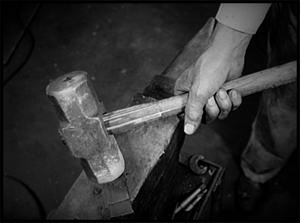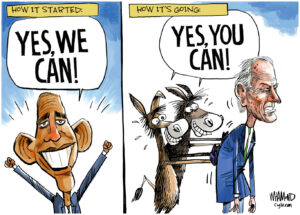The Last Labor Day?
We may still celebrate Labor Day, but our culture has given up on honoring workers as worthy of genuine respect.
Let’s get it over with and rename the holiday “Capital Day.” We may still celebrate Labor Day, but our culture has given up on honoring workers as the real creators of wealth and their honest toil — the phrase itself seems antique — as worthy of genuine respect.
Imagine a Republican saying this: “Labor is prior to and independent of capital. Capital is only the fruit of labor, and could never have existed if labor had not first existed. Labor is the superior of capital, and deserves much the higher consideration.”
These heretical thoughts would inspire horror among our friends at Fox News or in the tea party. They’d likely label them as Marxist, socialist or Big Labor propaganda. Too bad for Abraham Lincoln, our first Republican president, who offered those words in his annual message to Congress in 1861. Will President Obama dare say anything like this in his jobs speech this week?
As for the unions, they are often treated in the media as advocates of arcane work rules, protectors of inefficient public employees and obstacles to the economic growth our bold entrepreneurs would let loose if only they were free from labor regulations.
So it would take a brave man to point out that unions “grew up from the struggle of the workers — workers in general but especially the industrial workers — to protect their just rights vis-a-vis the entrepreneurs and the owners of the means of production,” or to insist that “the experience of history teaches that organizations of this type are an indispensable element of social life.”
That’s what Pope John Paul II said (the italics are his) in the 1981 encyclical Laborem exercens. Like Lincoln, John Paul repeatedly asserted “the priority of labor over capital.”
That the language of Lincoln and John Paul is so distant from our experience is a sign of an enormous cultural shift. In scores of different ways, we paint investors as the heroes and workers as the sideshow. We tax the fruits of labor more vigorously than we tax the gains from capital — resistance to continuing the payroll tax cut is a case in point — and we hide workers away while lavishing attention on those who make their livings by moving money around.
Consider that what the media call economics reporting is largely finance reporting. Once upon a time, a lively band of labor reporters covered the world of work and the unions. If you stipulate that the decline of unions makes the old labor beat a bit less compelling, there are still tens of millions of workers who do their jobs every day. But when the labor beat withered, it was rarely replaced by a work beat. Workers have vanished.
But we are now inundated with news (and “news”) about the world of capital. CNBC and the other financial media are for investors what ESPN is for sports junkies. We cheer the markets, learn the obscure language of hedge fund managers, and get to know some of the big investors in off-field interviews. Workers are regarded as factors of production. At best, they’re consumers; at worst, they’re “labor costs” cutting into profits and the sacred stock price.
They have faded away in both high and popular culture, too. Can you point to someone “who makes art out of working-class lives by refusing to prettify them”?
The phrase comes from a 2006 essay by the critic William Deresiewicz, who observed that we no longer have novelists such as John Steinbeck or John Dos Passos who take the lives of working people seriously. Nor do we have television shows along the lines of “The Honeymooners” or even “All in the Family,” which were parodies of an affectionate sort. “First we stopped noticing members of the working class,” Deresiewicz wrote, “and now we’re convinced they don’t exist.”
In his extraordinary book “Stayin’ Alive: The 1970s and the Last Days of the Working Class,” Jefferson Cowie spoke of how little we identify working-class people with their labor. “Workers occasionally reappeared in public discourse as ‘Reagan Democrats’ — later as ‘NASCAR Dads,’” he wrote, “or the victims of another plant shutdown or as irrational protectionists and protesters of free trade, but rarely did they appear as workers.”
With the worker disappearing from our media and our consciousness, isn’t it only a matter of time before Labor Day falls off the calendar? As long as it’s there, it should shame us about our cool indifference to the heroism of those who go to work every day.
E.J. Dionne’s e-mail address is ejdionne(at)washpost.com.
© 2011, Washington Post Writers Group
Your support matters…Independent journalism is under threat and overshadowed by heavily funded mainstream media.
You can help level the playing field. Become a member.
Your tax-deductible contribution keeps us digging beneath the headlines to give you thought-provoking, investigative reporting and analysis that unearths what's really happening- without compromise.
Give today to support our courageous, independent journalists.








You need to be a supporter to comment.
There are currently no responses to this article.
Be the first to respond.